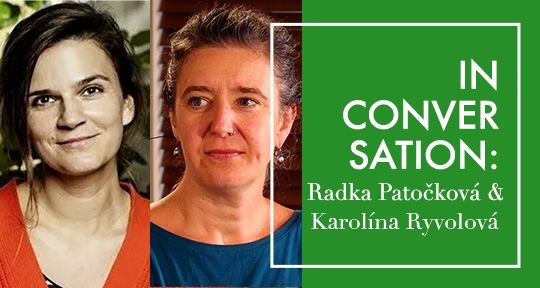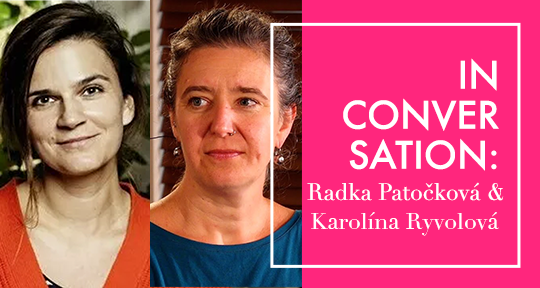Picking up from yesterday’s interview with Radka Patočková and Karolína Ryvolová on the founding of KHER, the only independent publishing house in the Czech Republic to spotlight Roma literature, today we delve further into Roma literature and identity—its history, notable figures, and ethos—with interviewer and Asymptote Editor-at-Large Julia Sherwood.
Julia Sherwood: What are the main themes, genres, and stylistic features of Czech and Slovak Romani literature?
Karolína Ryvolová (KR): Although the themes have naturally changed over time, the dominant feature and vessel of Romani stories continues to be memory. The writers relate their private histories in different contexts (persecution during World War II, post-war migration, successful pre-1989 integration followed by the tempestuous nineties, and so forth) and in that way contribute to the history of their community, which is still largely ignored by mainstream works of history. An important minority stream is feminist topics, pertaining to the traditionally subordinate role of the Romani woman as opposed to her ambitions and dreams, pioneered by Tera Fabiánová in 1970 and since successfully elaborated on by such writers as Ilona Ferková, Irena Eliášová, Erika Olahová, and Iveta Kokyová. The dynamics of the mutual Romani and non-Romani relationships in society is another regularly recurring theme. Most recently, we have seen the emergence of LGBTQ+ themes in Roma literature and interesting attempts at a complete divorce from ethnic narratives and issues.
JS: Traditionally, Romani culture has been predominantly oral––a good example is Elena Lacková’s memoir, Narodila jsem se pod šťastnou hvězdou (published in English as A False Dawn: My life as a Gypsy woman in Slovakia), which was recorded by Milena Hübschmannová (Czech scholar and founder of Romani studies, who is discussed in greater detail in the first interview). Lacková’s life story, providing an insight into the history and the tough realities of growing up and living as a Roma in twentieth-century Slovakia, also demonstrates the close historical links between Czech and Slovak Roma. Yet it wasn’t until 2022 that the book appeared in Slovak, translated by Júlia Choleva Vrábľová and published by BRaK (see Asymptote’s interview with publisher František Malík). What do you think is the reason for this late reception in the country of its author’s birth?
KR: I have no definite answer. On the one hand, I believe that until recently, most Slovaks have been able to read in Czech and vice versa, with reference to the more than seventy years of joint Czechoslovak history, so a Slovak translation has not been necessary. On the other, it seems from what we are hearing from our Slovak colleagues that the field of Slovak Romani literature is still quite scattered, distributed in fairly isolated hubs such as Nitra, Banská Bystrica, Košice, and Prešov, and it is perhaps not easy to develop a joint initiative in support of one of their classics. While Romani is much more widely spoken and present in Slovakia than in Czechia, there is at present no organisation with the visibility and impact of the likes of KHER in Slovakia. However, Alexander Mušinka from Prešov University has been working on rectifying this oversight. In 2021, he released the first volume of a monograph on Lacková, prefaced by a well-researched biographical paper that showed the breadth of the many years of her journalism for the Slovak Romani magazine Romano nevo ľil. READ MORE…


